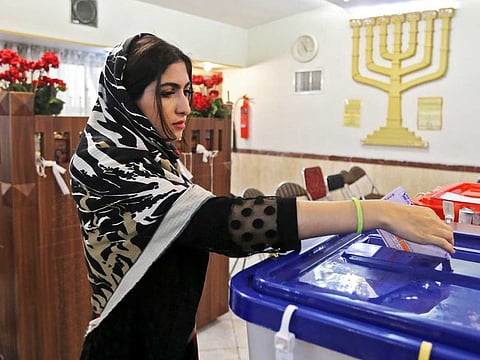Iran will become more confrontational after polls
Hardliners’ election victory is expected to pave way for an aggressive foreign policy

Hardliners in Iran won a majority in the parliamentary elections, which witnessed the lowest turnout since the 1979 revolution.
Those who were counting on the so-called ‘moderate reformists’ are disappointed again. Those who turned out to vote have given the belligerent conservative camp a landslide victory.
The low turnout, about 42 per cent, was expected since most moderates and centrist candidates, hundreds of them, were disqualified from running in the polls by the hardliner-dominated Guardian Council. On the other hand, the conservative camp managed to consolidate its forces and played the anti-America card very well, blaming the US for the deteriorating economic conditions.
The conservative groups, loyal to Supreme Leader Ali Khamenei, and their supporters saw the election as a chance to bring home the idea that Iran is in a virtual war with the US.
They oppose any engagement with the West, and have been pushing hard for Iran to leave the nuclear deal that limited Tehran’s ability to enrich uranium in volumes that could help develop nuclear weapons.
The recent US seizure of shipments of advanced Iranian weapons off the coast of Yemen, destined for Al Houthi militants, is a clear signal that Tehran is not going to make it easy for everybody in this region.Gulf News
Secondly, the elections came in the wake of unprecedented popular protests. People have been disenchanted by how the economy was handled by President Hassan Rouhani’s government.
Inflation in Iran hit a record 40 per cent by the end of last year. Iran’s currency, the rial, continued to lose value, reaching as low as 154,000 to the US dollar this month. It was trading for 40 to the dollar just two years ago. The US sanctions have slowed Iran’s economic growth despite government efforts to cut expenses.
As the hardliners celebrate their victory, described by Khamenei as a “shining day” in Iran’s history, the rest of the world wonders what all this means.
With the defeat of the Rouhani camp, Iran is widely expected to become more confrontational. Its foreign policy is likely to be more aggressive and may lead to renewed tension in the region. Pre-election efforts to start talks between Iran and its Arab neighbours may stall.
The recent US seizure of shipments of advanced Iranian weapons off the coast of Yemen, destined for Al Houthi militants, is a clear signal that Tehran is not going to make it easy for everybody in this region.
Its continued meddling in Iraqi affairs led to the delay in forming a new government in Baghdad, exacerbating the political and economic crisis in the Arab country. Despite all signs, we can only hope that a more rational Iran policy will prevail.



